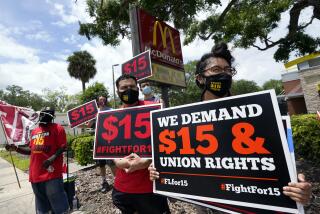Ex-Corporate Types Exploit Latent Talents With Franchises
- Share via
Tom Bright works a 12-hour day, no longer gets five weeks paid vacation a year and makes about what he did before he took an AT&T; Corp. buyout after 22 years.
But Bright, who runs a Mail Boxes Etc. franchise in West Covina, wouldn’t think of returning to corporate life.
“It was a big decision, especially when working for a big company like AT&T.; That was Ma Bell,” said Bright, 50. “But now I’m totally responsible for me, rather than someone else being responsible. I can build a business.”
Like Bright, an increasing number of corporate refugees are learning new kinds of management skills as franchise business owners. Nearly a third of new franchises are being awarded to ex-corporate employees, said Don DeBolt, president of the International Franchise Assn. There are about 500,000 franchise businesses in the U.S.
But DeBolt cautioned that the switch is not easy.
“It’s a huge culture shift from having all kinds of support systems to basically being your own support system,” he said. “The franchising chances of success are greater than going into business on your own, but it’s not risk-free and it’s not for everybody.”
DeBolt and those who made the change advise would-be franchise owners with a pocketful of buyout or early-retirement dollars to spend time investigating before investing.
Deloris Dean, 56, a former Los Angeles County purchasing administrator, spent two years researching her options before she opened a Mail Boxes Etc. store in Culver City.
“I heard some horror stories about franchises, people losing all their investment money,” said the 29-year county veteran. So she attended franchise conventions and small-business start-up classes, looked at various industries, talked to franchise owners and scrutinized the Uniform Franchising Offering Circular, a detailed document provided by each franchiser. The UFOC, 50 to 100 pages long, includes financial data about the parent company, lists past lawsuits and bankruptcies, spells out franchisee obligations and includes a list of current and former franchise owners.
Besides research, would-be franchise owners would also be wise to hire on as part-time or temporary workers in the industries in which they want to open a franchise, said Susan Kezios, executive director of the Chicago-based American Franchisee Assn., an advocacy group.
Then there’s the money.
Initial franchise fees range from $5,000 for in-home service franchises, $150,000 for fast-food restaurants and several million dollars for hotels. Franchise owners should also have enough money to cover initial operating costs.
“Corporate people talk about how much money it takes to get into a business, but you need to know how much money it takes to sustain a business until it reaches profitability in six months to three years,” Kezios said. “In a franchise, you’re using somebody else’s business system, but your business is starting from scratch.”
Other fees paid to the parent franchiser company include royalties of 3% to 15% of all gross sales and another 1% to 3% of gross sales for advertising.
DeBolt and Kezios also suggest hiring attorneys and accountants to analyze the detailed franchise agreement before signing.
“I’ve seen a franchise for a cookie kiosk, no bigger than my desk, with an agreement 80 pages long,” Kezios said. “Somebody coming out of the corporate world is used to taking a document like that and sending it down to the legal department. But when they take on a franchise, they become the legal department.”
That broadening of perspective may be the biggest hurdle for corporate types who were trained to be specialists, franchise veterans said.
“You have to realize how different it’s going to be,” said Bright, who expanded to a second store in Diamond Bar three years ago. “Basically, you are your own boss. You have to do everything. There’s no corporate blanket anymore.”
“It made me grow,” said Dean, who counts among her new skills such simple tasks as copying and faxing, which she would have relegated to a clerk at the county.
Kezios cautioned that owning a franchise is not like owning a home. It’s more like renting. Like a lease, the franchise contract has a time limit, usually 10 to 20 years, when it must be renegotiated. Plus there are rules and regulations that must be followed for the length of the contract.
“Studies have been done in terms of the level of entrepreneurial skills needed to run a franchise,” DeBolt said. “You’re not hitting a 10; it’s more like a 6 or 7.”
Charles Edwards, 44, who spent 16 years with General Electric Co.’s GE Plastics subsidiary and now runs Donut Inn franchises in Pasadena and Burbank, acknowledged that he knew nothing about running a business going in but is now at a stage where he’s eager to take his entrepreneurial skills a step higher and create his own business. The franchise limits him now, he said, but it still gives him a deep sense of personal fulfillment previously missing from his high-profile job as a regional manager.
“When something happens now, I know it happens because I did it,” he said. “There’s a sense of satisfaction with every step I take.”
For more information about franchising, call the 7,000-member American Franchisee Assn. at (800) 334-4AFA, or the 32,000-member International Franchise Assn. at (800) 543-1038. In addition, the College of Business Administration at the University of Texas in El Paso operates the Franchise Center, the only college-certificated program in the country with seminars on franchising. Information: (800) 687-4512.
More to Read
Inside the business of entertainment
The Wide Shot brings you news, analysis and insights on everything from streaming wars to production — and what it all means for the future.
You may occasionally receive promotional content from the Los Angeles Times.










